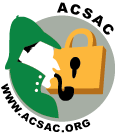Special Feature Panel: Lessons Learned In Election Technology From The 2008 Elections
Jeremy Epstein, Software AG (Chair)
ACSAC 2008 will occur just five weeks after the US 2008 election. Will it be like in 2000, where we won't know the results of key races until the middle of the conference and terms like hanging chad enter the popular lexicon? Or like 2006, where the phrase du jour was undervoting in Florida's 13th Congressional District? Will there be unexplained voting system failures? Will the failures we saw in several of the 2008 primaries (most notably in New Jersey) be repeated in the general election? What will we learn from the random audits, many of which will occur for the first time in November 2008? How will voters react to the technology, especially in states like Florida where many voters are seeing their third type of voting machines in less than ten years, and in Ohio where many jurisdictions are still deciding on equipment during the summer? Will the US Supreme Court ruling allowing voter ID requirements in Indiana have an impact on how voters view voting technology? Or just maybe everything will go smoothly, and computer scientists will look like Chicken Little? Will the new president and congress change the direction of the debate on voting policy?
This panel of computer scientists and election officials will dissect the election results from a technology perspective and speculate on technology and legislative changes that will come as a result of the election results.
Panelists:
- Dr. Barbara Simons, past ACM President and well-known electronic voting expert
- Dr. David Wagner, UC Berkeley
- Dr. Matt Bishop, UC Davis



